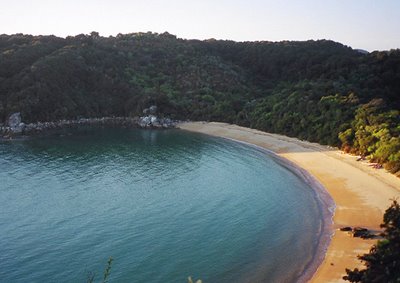Castle Rock Institute Blog
Monday, January 15, 2007
The Pernicious Character of Habit
We talked about this a lot, the anti-educational nature of habits and assumptions, but this article by Adrian Savage is an excellent piece. It's entitled "How to Break Out of Your Comfort Zone," and it really is a "how to" as well as a "why" approach to this idea. Here's a brief excerpt.
Over time, we all gather a set of constricting habits around us—ones that trap us in a zone of supposed comfort, well below what our potential would allow us to attain. Pretty soon, such habits slip below the level of our consciousness, but they still determine what we think that we can and cannot do—and what we cannot even bring ourselves to try. As long as you let these habits rule you, you’ll be stuck in a rut.
Go read it now. You'll be glad you did.
Wednesday, January 10, 2007
What does it mean to be "educated?"
A very nice article speaking directly to this core issue of CRI. It's "Liberal Education, Then and Now" by Peter Berkowitz, and you can find it in the newest issue of Policy Review, or here.
He finds that John Stuart Mill's notion of "many-sidedness" to be the key concept, and that "the highest justification of liberal education is that by forming free and well-furnished minds it prepares students to fashion for themselves a good life. More importantly, when it comes to applying Mill's thoughts to modern higher education, we should recognize that
Mill’s nineteenth-century analysis of liberal education is relevant to the twenty-first-century university not for the specific curriculum he proposes but because of the larger principles he outlines and the greater goods he clarifies. His analysis suggests several lessons. First, a liberal education aims to liberate the mind by furnishing it with literary, historical, scientific, and philosophical knowledge and by cultivating its capacity to question and answer on its own. Second, a liberal education must, in significant measure, provide not a smorgasbord of offerings but a shared content, because knowledge is cumulative and ideas have a history. Third, a liberal education must adapt to local realities, providing the elementary instruction, the stepping stones to higher stages of understanding, where grade school and high school education fail to perform their jobs. Fourth, the aim of a liberal education is not to achieve mastery in any one subject but an understanding of what mastery entails in the several main fields of human learning and an appreciation of the interconnections among the fields. Fifth, liberal education is not an alternative to specialization, but rather a sound preparation for it. Sixth, a liberal education culminates in the study of ethics, politics, and religion, studies which naturally begin with the near and familiar, extend to include the faraway and foreign, and reach their peak in the exploration, simultaneously sympathetic and critical, of the history of great debates about justice, faith, and reason. Seventh, all of this will be for naught if teaching is guided by the partisan or dogmatic spirit, so professors must be cultivated who will bring to the classroom the spirit of free and informed inquiry.
Great Stuff.
Thursday, November 09, 2006
Learn and be "Interesting"
I've never been a huge fan of the word "interesting" (too vague), but this post over at lifehack.org, "How to be Interesting," seemed to resonate nicely with something that drives CRI. The wrap-up distills it:
The similarity of all those ways are to increase your scope of thinking and knowledge, by jumping out from your comfort zone of knowledge.Putting it slightly differently, being interesting comes from being broadly educated, but that comes from continual learning, from making it a habit of exploring, experimenting, and welcoming challenge. The most interesting people never "get out of school." They understand what school is really about and strive to nourish that in their lives. Sadly, a great deal of what people think of when they hear the word "school" is far removed from their understanding of the word "interesting."
Do you want to be "interesting?" Develop the habit of learning and you will be.
Thursday, October 19, 2006
Barefoot Hiking
A great post about barefoot hiking over at Cool Tools. A wonderful account of what's added. Highly recommended!
Friday, August 04, 2006
New Blog at RBC
Our friends over at Rockbrook Summer Camp have a new blog. It's news and info about camp and such.
It's here: Girls Summer Camp.
Saturday, May 20, 2006
Two More from Coffin
I couldn't resist these...
"To love effectively, we must act collectively."
"Love measures our stature: the more we love the bigger we are. There is no smaller package in all the world than that of a man all wrapped up in himself."
Both from William Sloane Coffin Jr.
Thursday, April 13, 2006
William Sloane Coffin
Our friend and supporter, Rev. William Sloane Coffin, has died at his home in Strafford, Vt. He was 81. A well-known civil rights and peace activist, Dr. Coffin served as the Chaplin at Yale during the Vietnam war. He was an insightful thinker, preacher and writer, a welcome observer of American social practices.
Dr. Coffin was good friends with our Literature professor John Gardner and often communicated with the CRI.
Writing about the book of Job, he reminded us that when faced with suffering, the question "Why me?" is the wrong question to ask. Instead we should consider,
"Why not me?" When suffering comes, as inevitably it does to all of us, it is less important to ask where does it come from than where does it lead. Again, it's up to us.
Read Dr. Coffin's obituary in the New York Times.
Friday, April 07, 2006



